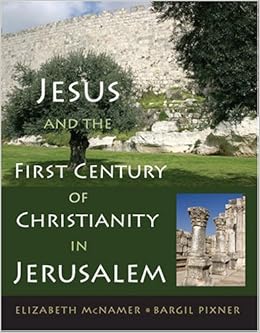Written at a very basic and simplistic level, this book is both wonderful and dangerous. It is wonderful because it provides such a simple synopsis. It is dangerous, however, because the authors are believers in a controversial theory that is not so basic or widely accepted as the simple text would make a person believe.
That idea espoused is that the first-century Christians were, in fact, derived from Essenes--in fact, in many ways were Essenes, the isolationist ascetics behind the creation of the Dead Sea Scrolls. The basis for this idea comes from several parallels in belief as well as the proximity of several archeological locations in Jerusalem. The arguments are in some ways persuasive, but part of that persuasion is in the way the information is provided, almost as if the ideas are foregone conclusions that most scholars take for granted.
These ideas cause the authors to propose that Jesus's trial was on a Wednesday, with the Passover meal on a Tuesday night, and his death on a Friday, with a resurrection on Sunday morning. The reason for this is that Essenes always apparently kept Passover on a Wednesday, following a 364-day solar calendar that apparently predated the lunar calendar that the authors says was put into Judaism during the Babylonian captivity. Since the trial could not take place at night (because of Jewish law), it is obvious that it must have taken place on Thursday. My understanding is that that the trial was not exactly by strict Jewish rules, however, which thus would not have precluded a night meeting. And the idea that the calendar was solar before Judah went to Babylon seems specious, since much is made in the Old Testament of the new moon as the means by which to calculate the various Jewish holy days, even in the historical books.
According to the authors, because Acts 6:7 says that priests joined the Christian sect and because the Sadducees were adamantly opposed to Christianity, and Pharisees weren't priest, the priests had to be Essenes. The argument here relies on various assumptions--that no Sadducee could or would accept Jesus, that no Pharisee was a priest, and Essene priests were welcome and served at the actual temple (when what I know of them suggests that they conducted their own religious rites separate from what they considered the polluted temple). But it is these kinds of ideas that are presented as nearly foregone conclusions, while similarities, such as both groups using lots to make a decision, are also pointed to as clear proofs of their being the same, rather than just being similarities among two Jewish groups (after all, lots were a customary way to make certain decisions in the Old Testament).
Another assumption the writers make is that the believers met every Sabbath in a synagogue for worship services of a sort, and then again on Sunday for Eucharist. I don't know the basis on which they make such claims, and without citation notes, it's impossible to find out (from another source, I'm guessing their source in Eusebius 3.27.3-6).
One thing I liked about the simple presentation, however, was the way in which in a matter of a mere one hundred or so pages, the authors were able to weave together so much Roman and Jewish history with the history of the Jerusalem church itself, giving readers a good feel for the events that affected the local congregation.
One interesting idea that authors have is that the Ebionites were the first schism from the Jerusalem Christians. I would figure the group would have been forged after the destruction of the temple and the disappointment over Jesus's failure to return at that time; this would have caused them to see Jesus as a mere prophet rather than as divine and to keep on with their Jewish traditions. But the authors see the Ebionite as forming before the temple's destruction. Rather, they claim, that a certain man name Thabuti (mentioned in Josephus and Hegesippus), who was apparently James the brother of Jesus's assistant (and of course, in these authors' reckoning, an Essene priest), expected to become head of the church after James's death; when Simon, Jesus's brother or cousin, was chosen instead, Thabuti left the group, taking followers with him, and these would become the Ebionites. I will need to read more on this subject.
Wednesday, February 14, 2018
On "Jesus and First-Century Christianity in Jerusalem" by Elizabeth McNamer and Bargil Pixner ***
Subscribe to:
Post Comments (Atom)







No comments:
Post a Comment